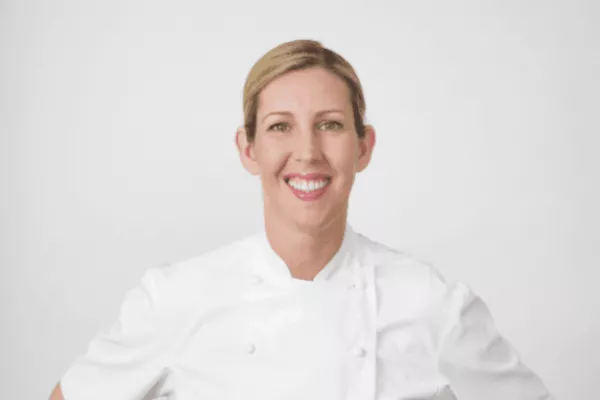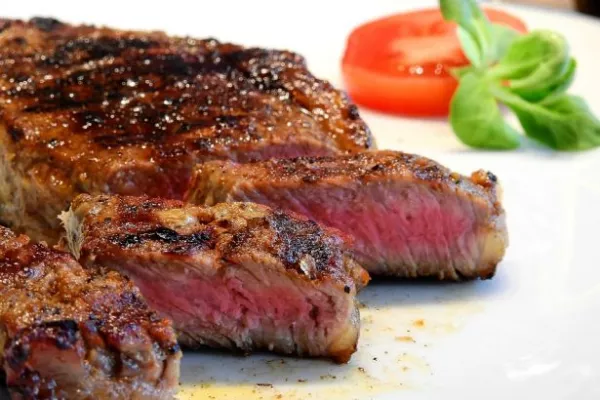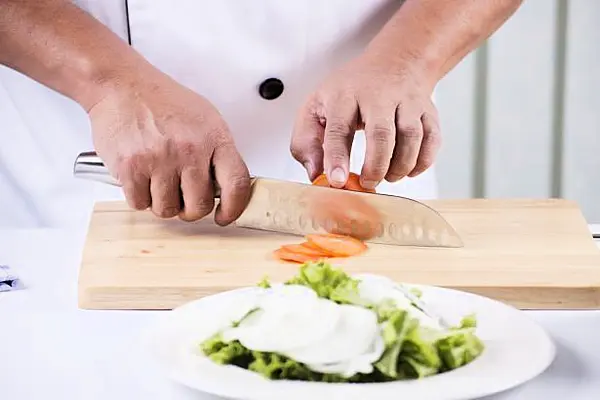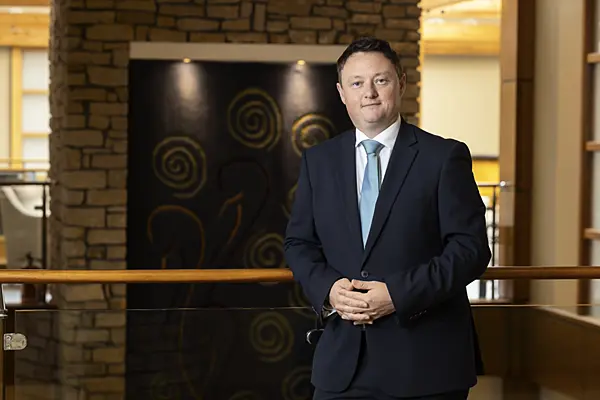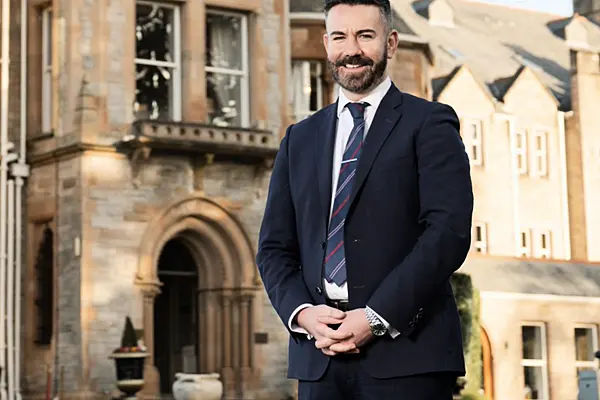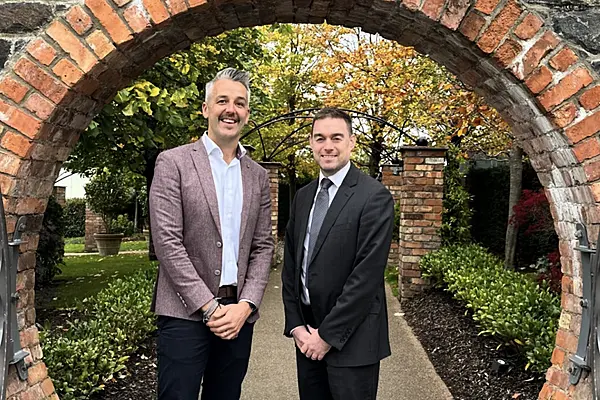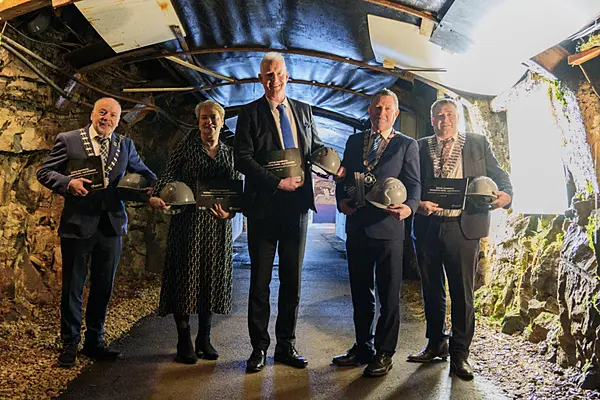As chef-patron at Restaurant Gordon Ramsay, CLARE SMYTH ran a three-Michelin-star restaurant. In 2017, she opened her own restaurant, Core, in London’s Notting Hill. The following year, Core was awarded two Michelin stars. Last year, in the middle of the Covid lockdown, Core was awarded three stars, making Smyth the first British chef to hold that honour in her own establishment. She is soon to open a second restaurant – Oncore – at the Crown Sydney luxury hotel, in Australia. Here she talks reopening, Michelin stars, and enhancing the hospitality industry.
This article was originally published in the Summer 2021 issue of Hospitality Ireland Magazine, in July of 2021.
The day that Clare Smyth and I speak, she has taken time off from preparing for the reopening of Core – after a very long year and a half – to speak to Hospitality Ireland. This, I have learned, is very typical of Clare, who is invariably courteous and professional, going out of her way to make an effort for the industry.
So, how are things in this ramping-up phase?
“We are in full swing, getting preparations done and staff training,” she says, “and, obviously, getting the building up to scratch again. We’re replanting our grass, painting – we’ve done a lot of work just to get everything back up to scratch again, so it’s all looking great for when people arrive. We’re really busy with that, but also getting the staff ready to go. All 42 of them stayed with us the whole time [through lockdown], which is great, that we kept them all, and that everyone’s healthy, and everyone’s well, so that’s really positive. Now it’s a case of brushing off that roster and getting back into service because it’s been a long time that they’ve not done an actual service.”

The elegant interior of Core
What kind of prep are they doing for this?
“We’re just doing some run-throughs and some tastings to get back on track because this time we’re reopening with three Michelin stars as well, so expectations are even higher than ever. We need to make sure that everyone’s on the ball to deliver.”
I have heard a lot of people saying that they feel nervous about resuming normal life, now that everybody has been so interrupted for so long. Does Clare think that there’s a general kind of jittery feeling, or does the enthusiasm for this outweigh that?
“Honestly,” Clare says, “I’m seeing a lot of enthusiasm. When we opened our bookings, we were just flooded. It was great – all the tables were gone in about 20 minutes or half an hour. The demand was insane, which is brilliant for us. We just want to keep that going. I’m seeing people really, really wanting to go out, and I get a sense of confidence this time – more so than the previous times that we’ve reopened. I can feel it. There is a lot more confidence.”
So, how was it for her? I presume that this is the longest time that she’s had off since she began working …?
“Yes. I’ve never, ever had time off like this. In one way, I have been working all the way through – we were doing home deliveries, and I’ve been working on opening the restaurant in Australia – so I’ve been keeping myself quite busy, but you’re right: that’s very different to being in service. I tried to use the time wisely and stay engaged with the team, with training for them online, and so on. They are all young people who need to be kept engaged. We were lucky to be able to involve some of them in doing the Core at-home delivery – we had most of the chefs on a kind of a rota system, so we could try and keep them engaged because it’s difficult for young people to not have a purpose. One of the most difficult things for anyone is when you get up each day, knowing what you’re going to be doing.”
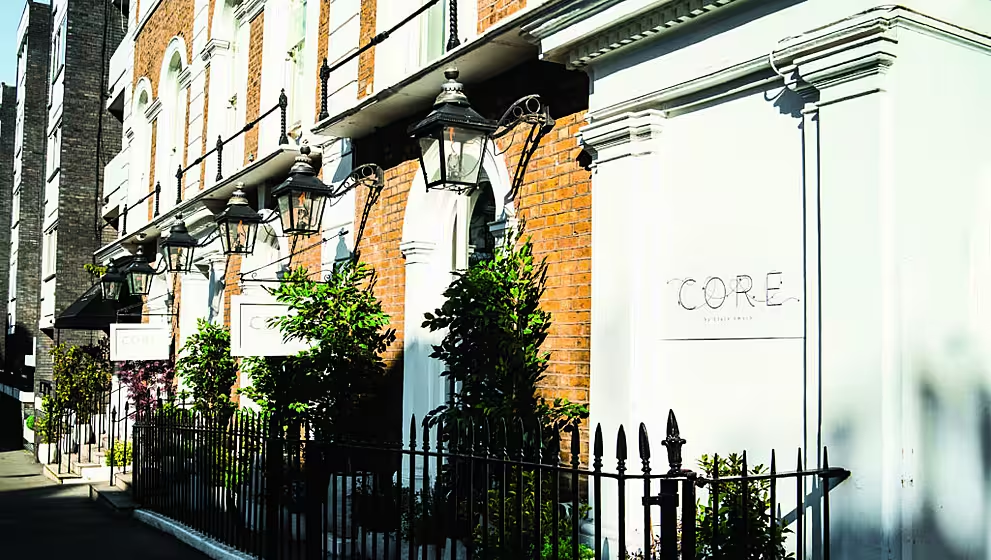
Exterior, Core
It is, I agree. Whatever about being a bit older and having to adapt, it is particularly hard for someone younger, who doesn’t have much experience of different upheavals, to stay psychologically buoyant in a situation like that. Did Clare find that they were willing and happy to keep engaging?
“Yes. A lot of our team are not from here. They don’t have family in London. They’re here to work, or they’re here to learn and study. Some of them have visas from other countries for two years – almost like a university course – and the sad thing is that they’ve lost a year of that visa that’s so valuable to them at that age. The reason they came here is very much about that learning, so it was hard to be stuck in a small flat in London on your own, without natural family around you, or very many friends. So, it was really important that we kept in touch with them, to make sure they were doing OK.”
What, I ask, about the undoubtedly surreal experience of getting three Michelin stars – three stars in three years – but getting them at this bizarre time in everyone’s life? What was that like for her?
“It was obviously brilliant because it was a dream come true for me, but, yes – as you say – a strange time to get them. We couldn’t celebrate – in fact, we still haven’t celebrated. This is just never what you would imagine – achieving that level, and then just not celebrating it at all. A glass of champagne on a Zoom call isn’t what we would choose to do, but, even so, it just made this last year.”
It was, Clare says, “the one really, really positive thing that happened in this last year. Almost, it was even more special because it was in such a terrible year, and something really fantastic happened. In that way, I think the year wasn’t a complete wipeout. We’re reopening with three Michelin stars, and the team are really energised, and all that work that we put in previously paid off – that confirmation of knowing that what we were doing was right – and that all that work, and all that effort, did pay off, and we’ve got them [the three stars]. Now we’ve got to look to the future: living up to that expectation of guests walking through the door.

‘I think we’ll appreciate restaurants more’
Is arriving into a restaurant that already holds three stars – as she did with Restaurant Gordon Ramsay – very different to winning those three stars in her own restaurant?
“Absolutely. It’s that validation to myself, that all the work that I put in paid off. To do it in my own right was something that was really important to me – proving to myself that I can start something in my own name, in my own vision, my own business, from scratch, and build it up. To do that, and make a success out of it, was the challenge I set myself when I left Restaurant Gordon Ramsay, and now the challenge is to maintain that and turn Core into a world-class restaurant that’s going to be here for the next 20 years, like Restaurant Gordon Ramsay, and like those brilliant, world-famous restaurants. That’s my ambition for Core, and, you know, we’re still very young – we hadn’t even turned three by the time the pandemic hit – so it’s been obviously traumatic, as it is for everyone, but we’re quite a young business as well.”
So, what now?
“I want to play the long game, for sure – make sure we keep building the business and making the restaurant better, and making it a brilliant place to work. I want to make it one of the best places to work in the world.”
Does Clare feel that that is a significant part of what she does – this sense of responsibility to the industry, to women within the industry, and to younger people within the industry? Does that drive her?
“Very much. I think it’s really important to me. I’m incredibly proud to be a chef, and incredibly proud of this profession. There’s a lot of knowledge and skill required, and I don’t think that’s always recognised. The hospitality industry offers fantastic opportunities for young people. There are so many opportunities within hospitality – great careers – and I want to help promote that and let people know, and move it forward. We have a Core Academy here, in which we put a lot into the training of our team. We want to build great young people who are well rounded, with great knowledge, to build their confidence to go on with us or further in the industry. I think it’s something that we need to really focus on more and more, particularly since Britain has now left Europe. We don’t have the more highly skilled Europeans coming. The hospitality industry is revered in other parts of Europe a lot more than it is in the UK – the hospitality schools are better – so that’s something we need to focus on more and invest in more, so that we can produce our own hospitality professionals.”
Does she think that that is something that is recognised, to the extent that it should be in government, rather than just within the industry?
“I don’t think the opportunities available to people are widely known. I think there’s a huge skill shortage, and there will continue to be, so we need to get more people into the industry in general. You’re looking at other degrees at university that kids are coming out with, and there’s thousands of them applying for one job, and yet, here in hospitality, there’s something like 22,000 vacancies in the industry right now. I’m hearing across the board that people are struggling to find staff right now to reopen with, which is going to cause a huge problem. This is something we should really focus on, at government level – training people to go into the industry.”
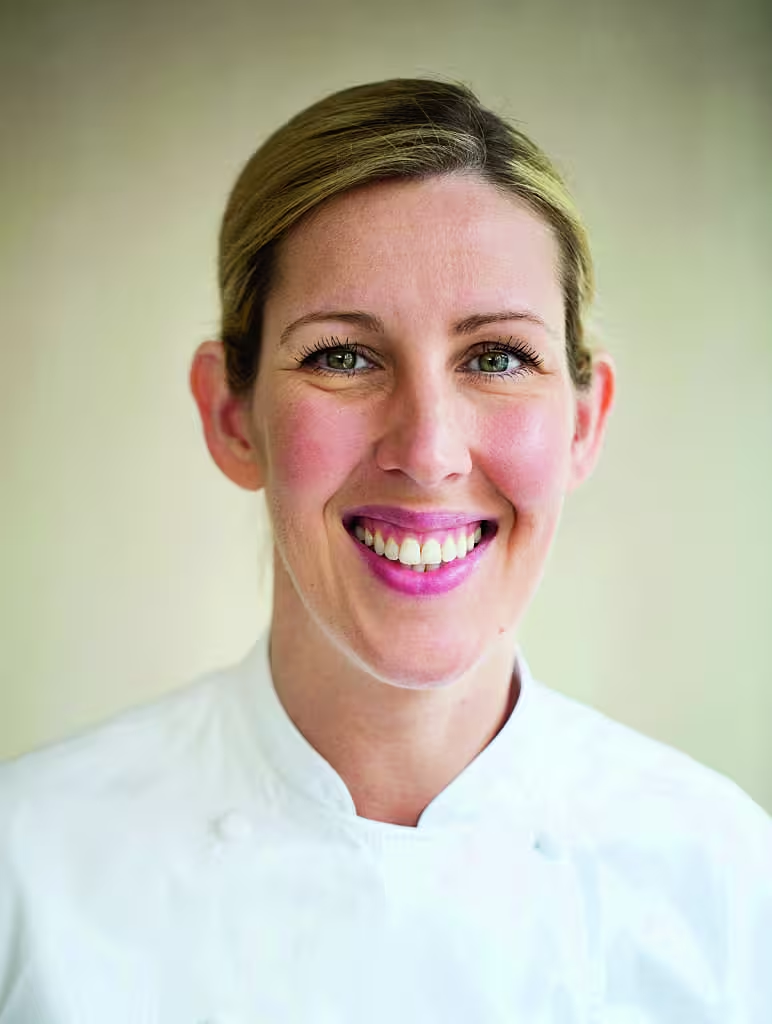
Clare Smyth; ‘it was definitely the next step.’
The perception, I suggest, is changing bit by bit, but still, there isn’t the same belief in hospitality as a career in Ireland and the UK as there is in Europe. Too often it is seen as a kind of in-between job or starter job. Does Clare think it would help if there was real government investment in, for example, an absolutely world-class hospitality school?
“Definitely – just that recognition of qualifications and training.” It is, she says, a great profession. “There is so much opportunity and different areas within hospitality to learn. It’s a really enjoyable profession, and salaries are great in hospitality. People don’t think that that’s the case, but when I compare the people here [at Core] with their other friends who are coming out of universities, they’re earning a lot more than them at that age, but we don’t talk about it enough, and we should be highlighting the opportunity.”
Does she think that the run of supermasculine, behind-the-scenes kitchen TV from the early noughties might be part of the problem, in that they made kitchens look like very fraught and shouty places?
“There’s no doubt,” she says. “We still have a bit of a reputation that hung over from that period, and I think that needs clearing up. The industry has very much changed – it’s not like that at all any more. I don’t hear any stories like that. All we talk about is professionalism – it is a more professional industry now – and yet we still have that legacy. I guess that sort of hung over what people think of the industry, but that is slowly going away.”
How did she find going out on her own? It has worked out beautifully, but was it scary at first?
“I was very ready for it, but it was very scary, too. It was definitely the next step for me, but it was scary because I was risking everything. I had a great reputation. I was the chef of a three-Michelin-star restaurant. I had shares in the restaurant. Gordon looked after me incredibly well. I loved my job and loved my time there, and then to step out of that and do it all for myself, with a start-up business – go to the bank, borrow money, produce my business plan – was a huge risk because I put everything into it – everything I had – not just financially, but reputationally as well. You start from hero, and the risk is you go to zero, but, you know, obviously, it has worked out, which is great, but all the work that I put into my career is what made it work out. It was in all the foundations – all those hours, all that work, all that focus. It all paid off. It’s great that it did, but it should.”
Having her own restaurant means, I presume, continuing to evolve and push the boundaries of what she does? Does she think that the public are ready for that? In other words, people no longer want to eat the same thing every time they go out, the way they maybe did 20 or 30 years ago. Now we rely on chefs to bring new things to us, and to keep moving that conversation forward.
“Definitely. I’m very much focused on what’s around me: the producers, the growers, the people who make things from around the UK and Ireland. That’s very much my focus. For example, the plates we use come from a 300-yearold company located in an area where most of those fine-bone China manufacturers have all closed. Nearly everything now is made somewhere else in the world for cheap, and you’ve lost those jobs and all those skills. That’s sad. I like to work with people who have skills and can do things.”
It is, Clare says, about “sustainability, but also cultural sustainability,” citing “people like Patrick, who is based in Northern Ireland and does all of our woodwork, and he did all the woodwork for the restaurant we’re opening in Sydney, Australia. That was really cool because he’s a guy who used to make little things – picture frames and other bits and pieces – and we got to know him and he started to do things for Core, and now he makes an awful lot of things for Core. All of our woodwork is designed by him for us. He can pretty much do anything and turn his hand to anything, which is great, and now he’s done the woodwork for Australia as well. That was just a huge order that went in for him, and I love that. Independent people who are passionate and really good at what they do, and who care – they’re not numbers. They’re human beings, and their can-do attitude is inspiring.”

Tell me a bit more about Australia and Oncore at the Crown Sydney?
“Hopefully, it will open in July, provided that travel opens up for me. Obviously, I’ll have to quarantine there for 14 days, but, even so, it’s still very difficult to get a visa, but it will hopefully open in the middle of July. The restaurant is on the 26th floor of a brand-new building that overlooks the Sydney Opera House and the Harbour Bridge – one of the most stunning locations in the world, and that’s why I fell in love with it. It’s a 65- seat restaurant, and it’s very unusual to find a fine-dining, small restaurant like that – normally, these places are much bigger – and, yes, it’s stunning, so we’re super-excited. The senior team are there now, working on it, and I’m quite jealous because they’re meeting all these incredible producers.” It is, she says, “a new challenge, and a very exciting one. It’s certainly going to add a new string to our bow on the other side of the world.”
How did it come about? Had she consciously been looking for something else, or did they come to you, and you just liked the idea?
“They came to me. They ate at Core a couple of times, and I think they had been looking for what was going to be right for that space. I had known people who had worked with them before, so there was an introduction, and it kind of went from there. I visited the site a few times. I’m typically in Australia a couple of times a year anyway, filming MasterChef or taking part in some of the gourmet festivals, so I’m very familiar with the scene of food there and a lot of the chefs. I went to see the site, and that was it. It was such a great opportunity.”
Logistically, how will it work? Will she split her time (assuming that we will soon be living in a world in which we’re all able to move around freely again)?
“As I say, naturally, I’d be in Australia a couple of times a year anyway, but I do have a really great head chef there, who I’ve worked with for the last almost-ten years. He was training across the world, but he came back to us here in Core last year. He worked with me at Restaurant Gordon Ramsay back in 2012, so he knows exactly what’s going on, exactly what’s required, and he’s ready for this. It’s his first head-chef role, and it’s great to be able to give him that opportunity.”
Presumably, the new world of Zoom has made this much easier …?
“Yes, it’s incredible what we can do now. We speak to him every day. The other day I was doing MasterChef Australia live from London.
What does Clare make of the idea that, post-pandemic, we will all value our social interactions more than we used to, that sitting and eating with friends will become something that really matters to us and that we prioritise within our lives?
“I do think so,” she says. “I think we’ve all had a lot of time to think about what it means to us, and to appreciate things more in life in general. I think restaurants being closed for so long and everyone cooking at home means we will appreciate restaurants more. No matter how good a cook you are at home, you’re probably not going to be able to recreate that full-dining restaurant experience, and so, hopefully, people will indeed appreciate that more.”
What plans does she have for the future? Presumably, for the next while, it’s about getting back up and running, bedding down with the three stars, and getting Sydney going …?
“Right now, absolutely, the focus is 100% head down, and just keep building and evolving Core, and getting Australia open, but I do see, in the future, more restaurants. The real reason for that is I’ve got this team to help me, which is absolutely brilliant, and as they grow, they need opportunities. Whether they go out into the wider industry or whatever, they have our DNA, and I would love to provide opportunities for them to continue to grow with my establishment because they’re just great. Many of them have been here so long already, and they can’t stay forever, so it’s about finding opportunities for them. The head chef here at Core, Johnny, and our restaurant director, Rob, have been with me from the beginning, and I’d love to provide opportunities for them, so that’s the reason for growing – they’re bright individuals, and they can’t stay where they are forever, but they really want to be a part of what we’re going to do in the future.”
Finally – because it’s impossible not to ask – what was it like doing Meghan and Harry’s wedding?
“Brilliant. It was a great thing for us to be a part of. The day itself was like a fairy tale – it was definitely something we’ll remember for a long, long time.”
Was it daunting? How many people were they feeding?
“There were a few hundred, but, you know, like anything, it’s someone’s wedding. It’s a big deal. You want to make it perfect for them because it’s a big day. Things like that have to run like clockwork. It’s military. You have to run on time on everything because your food is going to overcook, or desserts will fall apart otherwise, so you’ve got to be incredibly well organised.”
It’s an interesting point, I say – the creativity that goes into working with something so fragile. It’s not like painting or writing or sculpting or something durable – food is just so incredibly fragile and precious.
“Yes. It’s a lot of creativity, but also the skill to execute it every single time is very important. Inconsistency in anything is never going to work. If people expect something to be a certain way, then it needs to be like that, and at really high levels, the execution and that constant focus are really important because creativity is nothing without that.
CORE AT A GLANCE
OPENED: 2017
COVERS: 55 for dinner
STAFF: 45; 22 in the kitchen, 23 in the restaurant, bar, reception
PERCENTAGE BREAKDOWN BETWEEN FOOD & BEVERAGE:
65% food 35% beverage
Read More: Hospitality Ireland Summer 2021: Read The Latest Issue Online!

